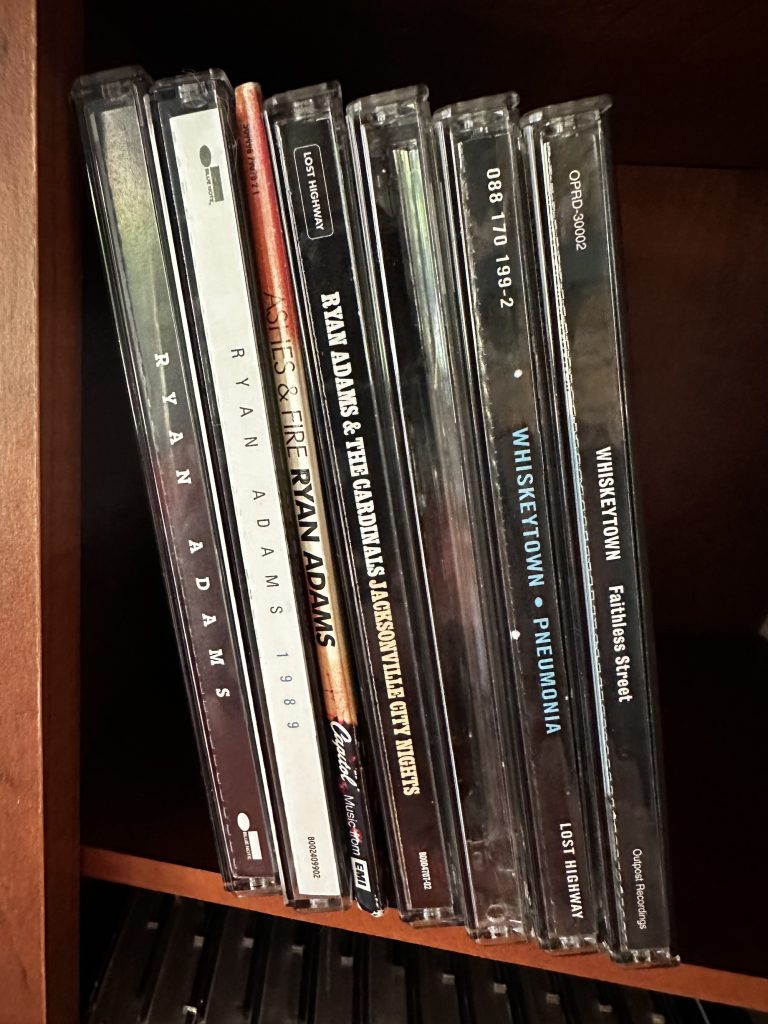
There was a time when Ryan Adams was interesting. He was supposed to be, as the newest rage is sometimes tagged, “Dylanesque”.
But I listened to his music, and I thought, Nah. I’m not buying this comparison.
For starters, Dylan’s lyrics are infused with emotional, philosophical, spiritual, and literary profundity. They tell stories that come from experience; they ring true–even as they’re simultaneously mysterious, and surreal. Their meanings twist and turn, reorganize and reshape, evolve and morph in your mind, much like the images of a kaleidoscope being turned in your hands. And, until Andrew Bird came on the scene, Dylan’s rhymes—so challenging and intricate, so gloriously in service of high level of vocabulary—stood alone.
By comparison, Adams’ lyrics are not nearly as dimensional. They are angry, sullen, and dark to the point of depressiveness. As for the drunken binges and drugged raging, I found very little philosophy there. The whininess, and the torrential downpours (sooo much rain in the seascapes of his songwriting—and so much hell, too!), were not in alignment with my predominantly cheery outlook.
But, okay, I listened, if not for the songs, then for the music. What his lyrics lacked in the story-telling that is , for me, essential, was compensated for by the “messages” that were coaxed from the instruments. He can rock out like nobody’s business on one album, and then, on another, he can banish us to an ethereal, foggy, Lanois-esque landscape.
One memorable Saturday evening in October 2011, I decided to treat myself to a first listen of the new Ryan Adams album when I was not behind the wheel. I closed the French doors to the music room and put Fire and Ashes into the disc changer. And I was mesmerized. The beauty of the album cast such a spell over me, I listened to it three times in a row. Even now, I find myself reaching for Ashes and Fire when I need a sensitive backdrop for reverie.
In 2013, things changed. This is when we began to learn-out-loud who Ryan Adams really was. Check out: https://www.nytimes.com/2019/02/13/arts/music/ryan-adams-women-sex.html.
I look back and I’m so mad at myself: Why didn’t I SEE it? It’s right THERE! Who he was and what he was doing couldn’t be hidden from the truth serum of song. I mean—in a court of law, his lyrics would be enough to put him away! I’m disgusted that I didn’t discern the truths they expose.
Mandy Moore, whom I adore, eventually revealed in interviews something of the emotional abuse she suffered during her marriage to Adams. She also shared on Instagram: “Love does not gaslight, love does not prey on insecurities, love does not manipulate, love does not cause chaos in its wake, love does not isolate, love does not threaten, love does not intimidate, love does not make you doubt your intuition, love does not silence women. Show yourself an act of self LOVE by knowing your worth and walking away from any of the above scenarios.”
Many of us can relate.
When we learned that Adams had wreaked havoc on the lives of somebody else’s daughters, everything changed for me and also for my son Rob and daughter Juli, both of whom were enthusiastic Ryan Adams fans. We were disillusioned. Just another sick jerk who won’t admit he needs help for his mental disorders. How could we support somebody like this? We couldn’t, and that was that.
I thought I was done with him. However, in 2015, I bought one more album. There was a big stir over something very unusual Adams did: he covered an entire album. He chose Taylor Swift’s 2014 release, the Grammy-award-winning Album of the Year, 1989, and he didn’t just pull it off. His interpretations and treatments of her songs gave honor both to Ms. Swift and to his own musicianship. (Since then, he’s covered two seminal works: Bruce Springsteen’s Nebraska and, astonishingly for the sheer nerve, Dylan’s Blood on the Tracks.)
Ingenious.
He found a way to sell records without risking the giving away of himself. Sure, it can be argued that his interpretations in and of themselves are revelatory. To a degree, yes, they reveal something about what he’s thinking and feeling.
Even so, for a singer-songwriter once touted to be a boy-wonder, a genius, a force for musical innovation, and a voice that will stand the test of time, these cover albums are exactly that: cover–cover behind which he can hide. This is singing and playing from behind a scrim. In these albums, the true “voice” of Ryan Adams is deftly muted.
Just as well.